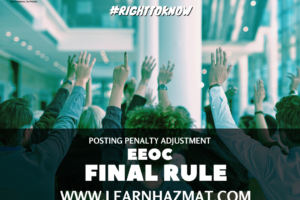Retail Giant Faces Fines for Failing to Comply with EPA and RCRA
June 5, 2013 | Retail giant Wal-Mart was recently fined nearly $82 million for failing to properly handle their hazardous waste.
Wal-Mart’s fines are the result of their failure to comply with regulations from the Environmental Protection Agency. Since 2003, the retailer had been disposing products considered hazardous (such as bleach, fertilizer, and trash) into local sewer systems.
EPA standards mandate that hazardous wastes be handled, transported, and disposed of a certain way – treating them as the hazardous wastes they are. All companies, agencies, and personnel have a responsibility for complying with this mandate. In Wal-Mart’s case, their practice of disposing waste was not only unsafe, it was also illegal.
André Birotte Jr., U.S. Attorney General for the Central District of California explained, “Retailers like Wal-Mart that generate hazardous waste have a duty to legally and safely dispose of that hazardous waste, and dumping it down the sink was neither legal nor safe. The case against Wal-Mart is designed to ensure compliance with our nation’s environmental laws now and in the future.”
In addition to this, Melinda Haag, U.S. Attorney for the Northern District of California, pointed out, “As one of the largest retailers in the United States, Wal-Mart is responsible not only for the stock on its shelves, but also for the significant amount of hazardous materials that result from damaged products returned by customers.” She indicated that the crime committed in failing to comply was the result of not properly handling, storing, and disposing their hazardous materials and waste. She later pointed out, “Wal-Mart is in a position to be an industry leader by ensuring that not only Wal-Mart, but all retail stores properly handle their waste.”
These negligent actions and the costly results make us mindful of the regulations set forth and how compliance not only a safety matter but also a legal matter. Now, Wal-Mart is taking the steps to educate and train their employees on how to handle their hazards.
The Resource Conservation Recovery Act (RCRA) was established in 1976. It is the law that governs the treatment of hazardous waste. The 40 CFR 260.10 states that any person, by site, whose act or process produces hazardous waste identified or listed in Part 261 or whose act first causes a hazardous waste is subject to regulation, and therefore, must be trained in the regulations for the treatment of hazardous waste.
Companies should strive to avoid the same mistakes Wal-Mart made in an effort to promote safety and the best possible practices for compliance. A solid foundation and understanding of RCRA will keep operations safe and compliant – contributing to the prevention of costly mistakes. For more information on how to properly, safely, and legally handle your hazardous waste, talk to a hazmat expert today. More information about RCRA training can be found here.



